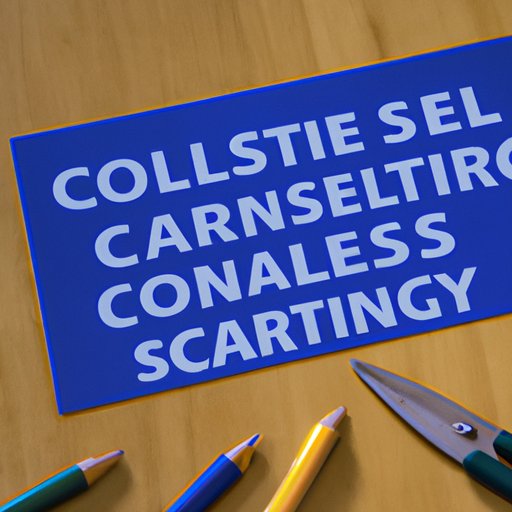
Introduction
School counseling is a rewarding and vital profession for today’s students. School counselors offer academic, career, personal, and social guidance to help students succeed in school and life. In this article, we will discuss the 10 steps to becoming a licensed school counselor, breaking down the requirements by location, providing tips for students and new graduates, outlining the different options for obtaining education and experience, and offering advice from current school counselors to help you enter and pursue a fulfilling career in school counseling.
10 Steps to Becoming a Licensed School Counselor
Step 1: Research school counseling requirements
Begin by researching the requirements to become a licensed school counselor. Most states require a graduate degree in school counseling, along with a specific number of hours of supervised clinical experience. You will also need to pass a state or national certification exam.
Step 2: Get a bachelor’s degree
Start with a bachelor’s degree in a related field, such as psychology, education, or social work. Many states have specific coursework requirements for school counseling graduate programs, so be sure to research them.
Step 3: Gain experience in a complementary field
While in college, gain experience in a related field through internships, volunteering, or work-study programs.
Step 4: Volunteer with children and adolescents
Volunteer with children and adolescents to build experience and develop skills. Consider activities such as mentoring or tutoring at-risk youth, coaching youth sports, or working with students in after-school programs.
Step 5: Choose a counseling graduate program
Choose a school counseling graduate program that is accredited by the Council for Accreditation of Counseling & Related Educational Programs (CACREP) or an equivalent accrediting body.
Step 6: Obtain a master’s degree in school counseling
Complete a master’s degree in school counseling, which typically takes two to three years. During this time, you will gain practical experience through internships or practicums, which will prepare you for the work of a school counselor.
Step 7: Get licensed as a school counselor
After graduating from your school counseling program, obtain licensure in your state. Requirements vary by location, but typically require passing a state or national certification exam and completing a certain number of supervised clinical hours.
Step 8: Secure an internship or fellowship
Secure an internship or fellowship to gain additional experience and training. Many school districts offer internships for school counselors, and organizations such as the American School Counselor Association (ASCA) offer fellowships and other programs to support the development of school counselors.
Step 9: Take and pass the required exams
Take and pass any required exams in your state or nationally. These exams will typically cover topics such as school counseling ethics, counseling theory and practice, and child and adolescent development.
Step 10: Maintain your licensure
Finally, maintain your licensure by keeping up with continuing education and professional development. This will help you stay current with the latest research, techniques, and policies in the field of school counseling.
Breaking Down the Requirements: How to Enter the School Counseling Field
Requirements for entering the school counseling field vary by state, so it is important to research the specific requirements for your location. Generally, however, school counselors must hold a master’s degree in a counseling-related field, such as school counseling, and must also pass a state or national certification exam. They must also complete a certain number of supervised clinical hours and adhere to the ethical guidelines of their profession.
From College to Career: How to Pursue a Path as a School Counselor
To pursue a path as a school counselor, students should start by researching their state’s requirements and selecting a related bachelor’s degree program. They can gain practical experience and build their skills through volunteering and internships. After earning a master’s degree in school counseling and obtaining licensure, new graduates can build on their education and experience by participating in internships or fellowships, attending conferences and workshops, and staying current with the latest research in the field.
Navigating the Education and Experience Paths to Becoming a School Counselor
Students can enter the school counseling field through a variety of education and experience paths. Some students may choose to pursue a bachelor’s degree in psychology or related field, followed by a master’s degree in school counseling. Others may pursue a graduate degree in school counseling or an alternative path, such as pursuing a teaching career and later transitioning to school counseling. Regardless of the education or experience path, it is important to research the specific requirements for your state and to gain practical experience and skills through internships, volunteering, or other opportunities.
Making a Difference in Schools: A Step-by-Step Guide to Become a School Counselor
School counselors play a valuable role in helping students succeed academically, socially, and emotionally. To become a school counselor, follow these steps: research school counseling requirements, get a bachelor’s degree, gain experience in a complementary field, volunteer with children and adolescents, choose a counseling graduate program, obtain a master’s degree in school counseling, get licensed as a school counselor, secure an internship or fellowship, take and pass the required exams, and maintain your licensure. With the right education, experience, and qualifications, you can make a difference in the lives of students and help them achieve their full potential.

Acquiring the Skills and Qualifications to Become a School Counselor
Successful school counselors possess a variety of skills and qualifications, including strong communication and interpersonal skills, active listening and problem-solving skills, cultural competence, and knowledge of counseling theories and techniques. Developing these skills and qualifications can be achieved through education and training, including graduate degrees, internships, and professional development opportunities. Building relationships with mentors and peers can also be a valuable resource for developing these skills and qualifications and for navigating the school counseling field.
Insider Tips for Aspiring School Counselors: How to Break into this Fulfilling Profession
Current school counselors offer valuable advice for those aspiring to enter the field. They suggest seeking out volunteering and internship opportunities, building relationships with peers and mentors, staying informed about the latest research and techniques in the field, and pursuing ongoing professional development. They also suggest gaining a broad range of experiences and skills to prepare for the diverse demands of the school counseling profession.
Conclusion
School counselors play a crucial role in helping students succeed academically, emotionally, and socially. To become a licensed school counselor, it is important to research the specific requirements for your state, obtain a relevant bachelor’s and master’s degree, gain practical experience and skills, secure licensure, and pursue ongoing professional development. By following these steps, you can make a difference in the lives of students and achieve a fulfilling and rewarding career in school counseling.





